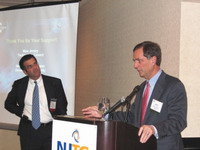Pharmion Corp to be acquired by Celgene Corp
Celgene Corp.'s plan to acquire Pharmion Corp. would unite two biopharmaceutical makers that have been working together in marketing thalidomide as a cancer treatment.

That drug, sold as Thalomid, along with others such as Celgene's Revlimid and Pharmion's Vidaza, should be under one roof in the second quarter of 2008, executives at the companies said Monday.
"This strategic acquisition is an ideal fit that will expand our role as a leader in hematology and oncology," said Sol J. Barer, chairman and CEO of Summit-based Celgene, which was already one of the world's largest biotech companies by market capitalization.
Executives said they were confident that the deal, announced Sunday night, would survive U.S. and European antitrust scrutiny without requiring divestiture of products in major markets. They said shareholders could vote in February or March.
Under the acquisition agreement, Celgene would buy Pharmion for casg and stock with a combined value of $72 a share.
Each share of Boulder, Colorado-based Pharmion will be exchanged for $25 in cash and a number of Celgene shares to be determined by an exchange ratio. Upon closing, Pharmion stockholders will own 6 percent of Celgene's outstanding shares.
Pharmion shares rose $14.93, or 30 percent, to $64.21 in afternoon trading after rising to a 52-week high of $68.04 earlier in the session. Shares of Celgene fell 78 cents to $64.12.
Banc of America Securities analyst William T. Ho said the terms of the deal seem favorable to both companies. "We believe that there are few deals that make as much business sense and add as many operating synergies in the biotechnology space," he wrote in a note to investors.
Robert W. Baird & Co. analyst Christopher J. Raymond, in a note, wrote he was "pleasantly surprised by the outstanding premium Pharmion has been able to garner" in the deal and saw "little risk in the deal not going through."
Vidaza and Celgene's Revlimid are both approved for the same purpose, but do not compete since Vidaza is for higher-risk patients, Celgene spokesman Greg Geissman said.
Citigroup analyst Dr. Yaron Werber said a key risk is that the combined entity's future relies on the successes of thalidomide and Vidaza.
"Pharmion has become one of the main players in the hematology space globally," Werber said, in a note to investors. "On the heels of positive overall survival data for Vidaza for (blood cancer) we expect that sales will accelerate both in the U.S. and Europe."
Revlimid is also a treatment for multiple myeloma, a bone cancer, as is Thalomid.
Six years ago, Celgene licensed Thalomid to Pharmion for development of the European market. The product is derived from thalidomide, an infamous morning sickness treatment that caused flipperlike limbs and facial deformities in 12,000 babies overseas before being banned in 1962. Celgene revived it as a cancer-fighting drug.
Celgene, with about 1,650 employees, had 2006 revenues of $898.9 million (613.4 million EUR), while Pharmion, with about 500 employees, had 2006 revenues of $238.6 million (162.8 million EUR).
Geissman, the Celgene spokesman, said the company would not comment on whether there would be layoffs.
Celgene said it expects the deal to dilute 2008 earnings slightly but to add to earnings beginning in 2009.
Subscribe to Pravda.Ru Telegram channel, Facebook, RSS!





